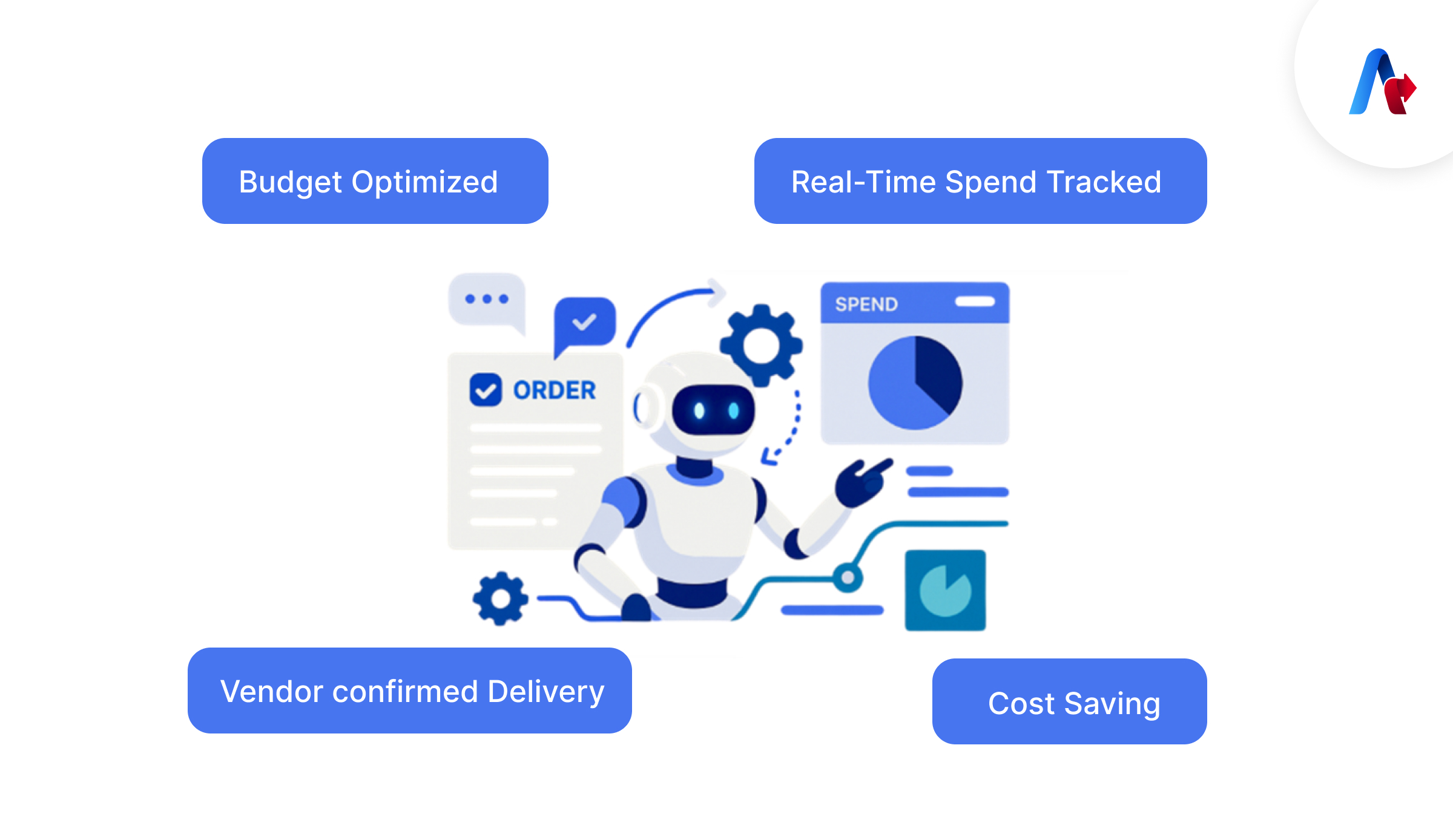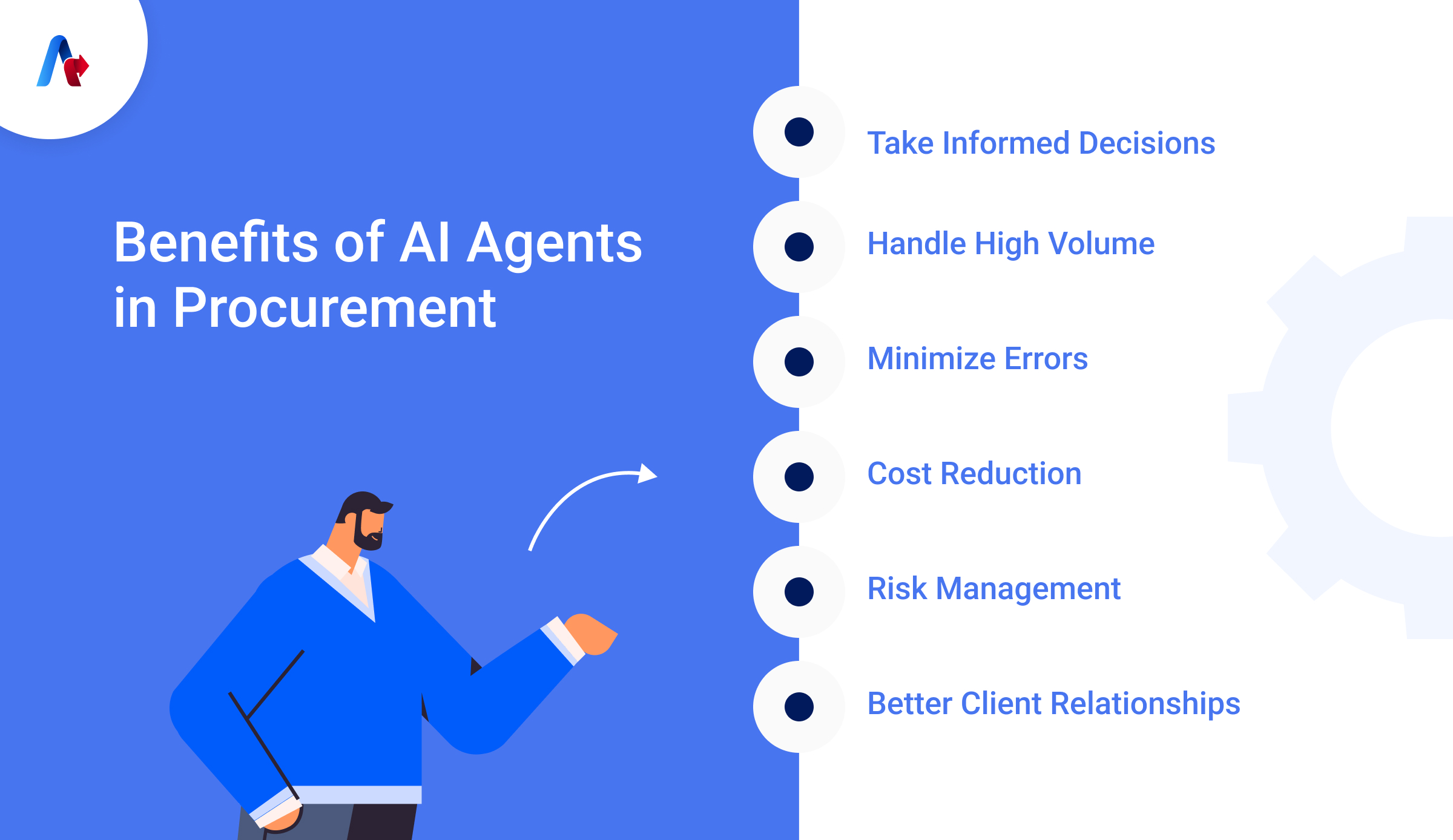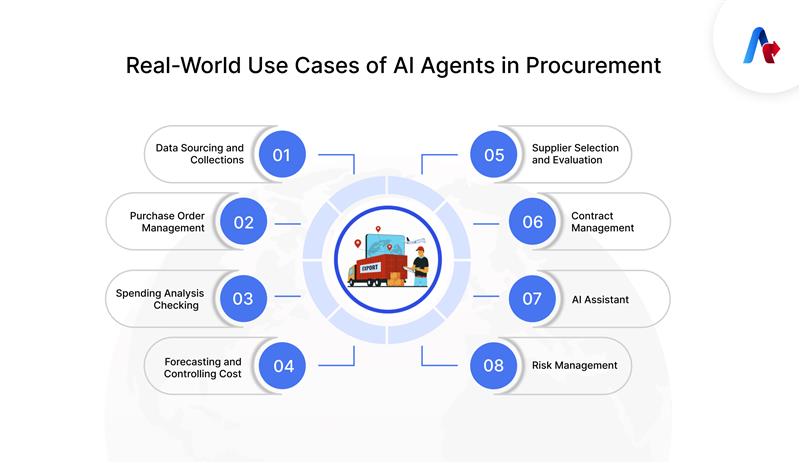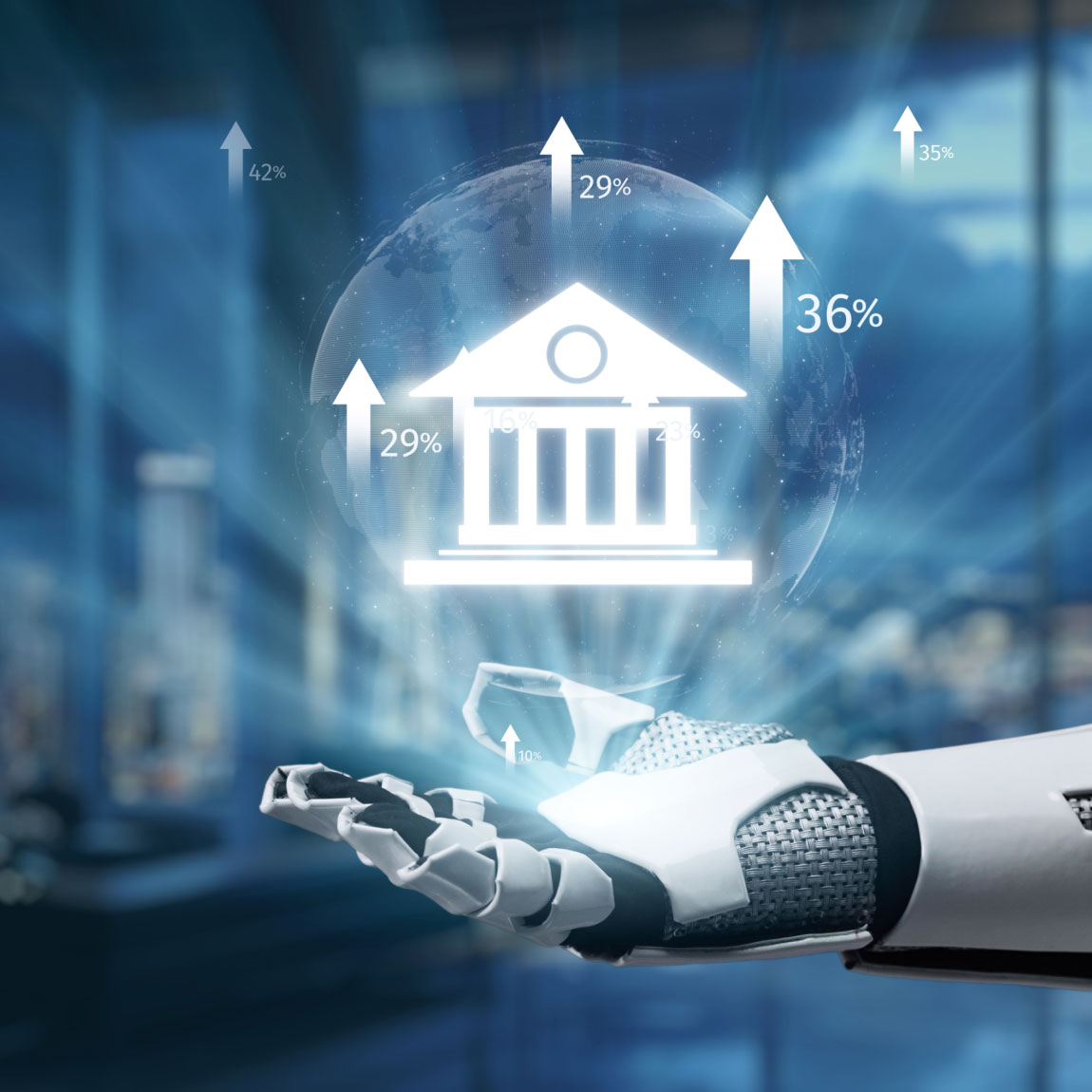AI Agents in procurement
BLOG
16 min read
What Are AI Agents in Procurement? A Complete Guide to Their Impact
Quick Summary
The AI agents in procurement can help supply companies automate their tasks, such as purchasing, data analysis, supplier analysis, and compliance. The traditional system needs more effort, but AI agents make independent and context-aware decisions to minimize costs, reduce errors, and improve efficiency. Artificial intelligence in the procurement process can speed up analysis, risk management, maintain client relationships, and position your organization as the top in the market.
AI agents are changing how organizations optimize operations, spend, and maintain competitive advantages. The AI agents in procurement are moving further ahead because the team can automate supply tasks and sometimes deal with negotiations. It is not just about suppliers and contracts, but also speed, accuracy and smartness.
Agentic AI for procurement is a digital employee that can handle onboarding, compliance, purchasing and more. Through procurement automation, you can complete repeated and mundane work and make faster and data-driven decisions. AI procurement is smarter and strategic, where traditional methods fall short.
What are AI Agents in Procurement?

Procurement AI agents are a new method of including agentic AI in your organizational procurement process. It is an artificial intelligence that understands the environment and decides how to complete the specific tasks with limited intervention from humans.
It is a multi-agent system, where one agent performs a task and passes it to the next to complete the whole work. This technology works in many areas, including software, supply chain, and customer care. AI orchestration is a method that helps companies coordinate these agents and streamline the workflow.
Want to know more about this topic before you adopt it? Check out What Are AI Agents? Exploring Their Capabilities and Real-World Applications
AI Agents vs. Traditional Procurement Tools
The traditional tools are not ideal due to their limited actions and the need for frequent human intervention. The procurement management AI agent is smart, autonomous, and makes real-time decisions.
Let’s see a quick comparison
| Feature | AI Agents | Traditional Procurement Tools |
|---|---|---|
| Tasks Handling | Autonomous and context-aware decision-making | Manual or rule-based automation |
| Data Analysis | Real-time analytics, pattern detection,and predictions | Basic reporting and dashboards |
| Supplier Interactions | AI negotiation, follow-ups, and chats | Human-dependent communication |
| Adaptability | Learns and adapts to new scenarios | Limited adaptability |
| Speed & Efficiency | Fast execution with minimal human input | Slower due to human intervention |
| Error Handling | Self-correcting with intelligent exception handling | Prone to manual errors |
| Cost Optimization | Proactive savings through AI-driven recommendations | Reactive cost control |
| Scalability | Scales easily with minimal efforts | Requires more resources as volume grows |
The procurement process becomes easy and productive when AI is in the workflow. Gitnux market stats indicate that 78% professionals use AI agents or automation tools for supplier risk management. The study also further details that a company can reduce costs up to 20% from these tools.
AI agents are more than regular automation. Want to learn more from Accelirate?
Talk To Our ExpertWhat are the Benefits of AI Agents in Procurement?

The AI technology is helping procurement by automating several daily tasks that are time-consuming for the teams.
Take Informed Decisions
Companies are using AI to perform several tasks along with humans, as they help to reduce errors and make better decisions in real-time. They can also autonomously analyze the market conditions, monitor supplier performance and let you know if there are any risk factors.
Using these types of technologies is helpful in procurement and gives a competitive edge in the field. For example, agents in this area can assess the marketing conditions regularly to see any issues. They can analyze the data of the commodity price and suggest adjustments in the strategies faster than human workers.
Handle High Volume
Global politics, tariffs, and the policies of different governments impact the procurement. There are some other factors that are not in the control of supply chain companies, like weather and the market. This is a very complex situation where employees face lots of pressure in managing the situation.
If weather conditions are affecting the shipment and causing delays in delivery, AI can reroute the shipment automatically and provide the data that is necessary for the action. It is helpful for humans to mitigate the burden during times of struggle. Automation can act quickly and take proactive decisions for better delivery.
Minimize Errors
The inclusion of artificial intelligence in procurement is a good idea to reduce errors. The manual process can make errors that affect the business, but the intelligent agents in the supply chain can mitigate the errors compared to real agents. It can assess the situation and make better decisions with fewer errors.
Think about checking an invoice that does not match the purchase order. In this situation, humans should go through the invoice manually and find out the errors or mismatches. It is not the case with AI with machine learning because it can identify the problems faster than your workers.
Cost Reduction
The initial cost of purchasing the automation is higher, but it will pay off later when you move forward. The main advantage is that these agents can check the history, trends, and supplier performance to identify the most cost-effective method. It also reduces the cost by doing repetitive jobs that need lots of manual effort.
Using AI agents in procurement can improve productivity and avoid unnecessary costs. When you use agents in procurement areas, you can reduce the cost of manual labor, ensuring significant savings on the procurement process. A report by McKinsey says that companies using AI get a 10% reduction in overall cost.
Risk Management
A proactive risk management is essential in AI procurement systems. Traditional risk management system often struggles to keep up, whereas the automated method can predict things in advance to minimize the risks. AI agents are smart since they can learn from the past and recommend the right measures before escalation.
Agentic AI for procurement checks with external factors, such as weather, market conditions, and combines everything with internal data to offer better insights that are usually missed by human beings. Procurement management AI agents and humans can work together to help the organization make better decisions.
Better Client Relationships
The relationship with the client is imperative, and this was once handled by humans. After the arrival of the AI, things have changed a lot. Now, the agents are helping the companies in client relationships, especially onboarding and inventory management, which will take the burden off human agents.
When AI takes more repetitive jobs, humans can focus more on the strategic work, where critical thinking and decision-making are vital. More than this, it can assess the supplier's needs and maintain inventory according to demand. AI agents can also predict the issues in advance and offer measures to mitigate them.
Related Read: Enterprise AI Agents: Use Cases, Benefits & Impact
How Procurement Automation AI Agents Work
A purchase requisition AI agent, along with LLM capacity, will perform several tasks at your organization. It understands the language and images and continues its tasks autonomously. AIs are perfect partners for human beings as they can improve productivity and save time in the procurement process.
- One of the most important things for the function is the data the agent gets from the different sources. It can interact with other agents through orchestration and import data to improve its precision.
- When this technology is implemented in the supply chain, it can perform various functions, such as client management, supply management, pricing, and checking the purchase history for better offerings.
- A business makes AI agents by using programs like Python and Java. They easily integrate with procurement systems such as APIs, EPRs, databases and procurement platforms.
- After implementation, the next task is the action. The agent processes the information and takes the best possible decision. If the action includes other agents or humans, it passes to the next area.
- This is not the end of the action. The AI does not stop with its actions, but learns from the past and improves based on the feedback, making it an ideal solution for a changing world.
9 Real-World Use Cases of AI Agents in Procurement

Learning how AI agents work in real time is essential for the right selection. They are helpful for various areas like evaluation, purchase and more. This section will explain some of the key use cases.
1. Data Sourcing and Collections
Manual efforts like data entry and RFP generation are time-consuming work in the supply chain areas. AI is a great help in these tasks, where it can collect suppliers' profiles from various sources, autofill details, and consolidate data with no human intervention.
This is important for a team since they can spend lots of time on other tasks, especially building relationships with suppliers and performing evaluations. With automation, you can get a real-time view of procurement activities and performance.
2. Purchase Order Management
AI agents can reduce the effort and errors in approvals and purchase orders (POs). After submitting the request, artificial intelligence in procurement analyzes those details, approves them and sends them back to the suppliers.
It can check the accuracy of details by looking at the past orders and inventory level, and spare your team for strategic efforts. AI also analyzes your spending patterns and suggests areas for cost savings.
3. Spending Analysis Checking
Finding out where the money is going is a difficult effort for the procurement team, and this even creates hurdles with EPRs and P2P areas. This is where the data is scattered, and it is not easy to understand the spending of the budget.
When AI agents for procurement are in action, they unify the data and give you accurate spending details. Agents can identify the repeated purchases and offer special volume discounts for a particular supplier. ML detects the problems and helps you uncover the saving opportunities that you don't get from traditional tools.
4. Forecasting and Controlling Cost
One of the most important advantages of AI agents in procurement is that they can forecast the demand through the purchasing behavior of the suppliers. Once the AI gets what it needs, it predicts the price and checks delays by considering internal and external factors.
Think about a scenario where a delay in shipping causes a surge in demand. The ML might detect this pattern and recommend that you switch to other suppliers. It can also see the market price, demand for the raw materials and suggest fast-tracking the purchase to lower the purchase price.
5. Supplier Selection and Evaluation
Getting a good supplier is the most critical part of the procurement process, and this job becomes easier when you are using AI agents. They dive deeper into the historical data of the suppliers, check performance, financial stability and the marketing conditions.
After the initial process, the artificial intelligence can assess the best supplier based on price, contractual obligations, and compliance, along with the above factors. In this way, the team can spot out the right fit and if a particular one is posing any risk, it will flag the reasons, such as stability or compliance violation.
6. Contract Management
Once you find the proper company for the supply, the following process is to complete the contract. When manually processed, it takes lots of time and needs human assistance, but agentic procurement AI ensures that these things are up to date by checking the eligibility, especially regulations.
The relationship with the suppliers is vital in the procurement, and a business can engage AI in the work along with real human resources. Technology like this can automatically review and identify any problems in the contract and documents before finalization.
7. AI Assistant
An ally from automation for the procurement team is a great asset because it can work tirelessly 24/7. As discussed earlier, these agents can take time-consuming tasks, speed up the decisions, and help humans save hours in day-to-day activities.
They are not a replacement for human but make their work faster and smarter. Artificial intelligence assistance can help your team to make purchase requests, answer questions, and guide you through the entire purchase process.
8. Risk Management
There is risk for all businesses, and it applies to this sector too. Supplier risk is the most important one here, and intelligent automation can assess the growing risks, such as contract violations and invoice mismatches. Along with that, ML learning scans the outside factors, including suppliers' credit scores and geopolitical events.
After considering these internal and external factors, the procurement team can make better decisions on the suppliers. For instance, if a sea route is disrupted by high waves, the AI in procurement alerts the team and reroutes the shipment to avoid problems in the supply areas, so that the company can avoid losses.
9. Compliance Check
Regulations for the company and the suppliers are imperative to avoid legal consequences. Even if the supplier you rely on violates something, it can affect your business partially. This is the area where organizations need strict monitoring, and agents can do that job well.
When such a violation happens, AI automation can alert the respective persons and provide an explanation for why the risk occurred. The monitoring is another part where the organization gets help because it can continuously check the compliance risk, both internal and external and alert like an officer with solutions.
Take a first step to automation with Accelirate and experience the difference in your ROI.
Get Started NowHow to Implement Artificial Intelligence in Procurement
If you are thinking of using AI agents in procurement processes, it is a good idea, but you must consider some things before finalization. It is important because the adoption must yield the expected results and mitigate the team's mundane tasks.
There is no common rule that fits all the partners, but many factors, such as size and effort, come into consideration. It is essential that you consider the experts, such as managers, procurement officers, and other stakeholders, to get better results.
Set the Automation Goals: Do not just accept the technology because your competitors are adopting it. Instead, assess what you need to automate and how they are going to grow your business.
This should include the cost, speed, procurement, and other vital areas. You need to assess whether AI agents or RPA are fit for the daily task, or it will add some extra cost to your budget.
Assess Infrastructure and Data: AI agents in procurement are brilliant when you offer the best data they need. Gather all and check whether they need data cleaning to get the best results.
Also, assess the current procurement tools to support AI and integration. If not, the company must update the equipment and infrastructure.
The Right Platform Selection: Don't pick one at first sight, but research the market for better options. The platform should align with your use cases, goals and objectives.
The one you select must offer NLP, ML, and other abilities to automate your routine tasks. The tool you opt for must easily integrate with your existing technology.
Implement Partially: The setup takes place after a long study by your expert team. There is only a little chance of failure in what is planned, but the implementation shouldn’t be wider in the initial stage.
The best way is to go with a single department or the process to avoid the disruption and see how it works. Once you get the result, spread it across other departments.
Training for AI and the Team: After collecting quality data, ensure proper training to get accurate results. This is not just important for the AI alone, but also for the team that uses this technology.
Without proper training for AI and humans, it will not give the expected results. Always ensure collaboration between technology and humans for better productivity.
Compliance and Result Evaluation: Don't leave it after induction; evaluate the performance of AI in procurement and optimize for better performance if necessary.
Measure the KPI (key performance indicators) on cost saving, efficiency, time and other objectives set in the beginning. Check the ethical use and other compliance to avoid penalties and legal actions.
Conclusion
The technological advancements are influencing the supply chain with faster speed, analytics, data and many more. Artificial intelligence AI agents are creating a big change in this advancing effort.
With a reliable partner like Accelirate, your company will be at the forefront of procurement techniques and ensure data-driven output in business. By using AI agents in procurement, you can position yourself as the leader and stay ahead of this competitive market.
Wish to employ an advanced AI procurement agent for your supply chain?
Talk To Our Experts NowFAQs
No, AI is not going to replace humans completely. It is going to take routine tasks in the procurement. By doing so, it will augment humans’ capabilities and bring growth to your business. Artificial intelligence is effective when working with humans.
A purchase requisition AI agent is useful for repeated tasks, to improve your decision-making and efficiency. There are numerous areas where it is going to help: supplier risk analysis, contract management, and cost management.
Companies that use intelligent technology can help improve their shipments and supply chains. For example, if there is any problem with the stock, it can alert you to fill it up, or if there is any delay due to shipment, agents can suggest finding alternatives to avoid consequences.
Clearly understand what your goals are and where you want to fit the automation. Talk to your team, find out bottlenecks, assess your integration capacity, implement partially and evaluate the results.
First, learn where you have to implement the system and look for the platforms in the market. Once you find the choice, automate the repetitive processes and free up your team for other vital tasks. After implementing, assess the KPI, such as saving time, effort, and productivity.


